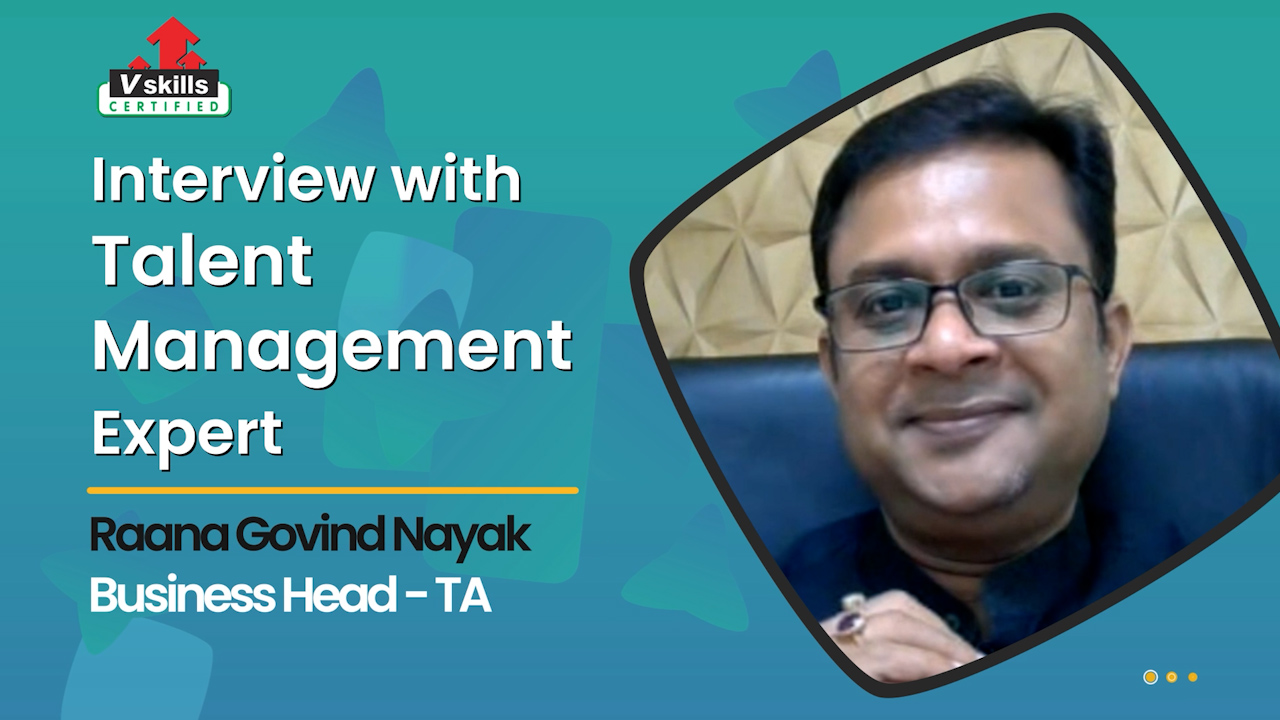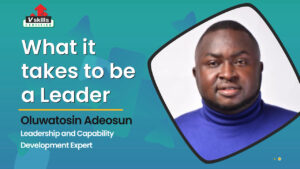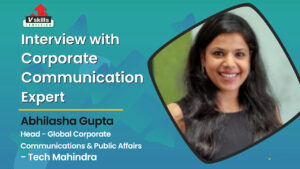Talent Acquisition is not just about hiring new staff and retraining staff that are already working in the company but also for building a structured talent acquisition strategy. The work of a talent acquisition manager is extremely dynamic with a focus on building Talent Pipelines, strong Employer Branding and overall Talent relationship management. In this blog, we shall not only learn about the career opportunities as a Talent Acquisition Manager but also understand the qualities employers look for while hiring.
In this expert interview series, we have with us Mr. Raana GovindNayak. He has over 18 years of progressive experience in all phases of a business environment and 6 years of experience in Training and Consultancy. He specializes in all aspects of Talent Acquisition and HR Operations including end-to-end IT staffing solutions, Creating and Managing Global Delivery Centers (GDC), Managed Services and Business Excellence centres.
Mr. Nayak is Business Head – Operations at Servicio IT Solutions and has worked in senior capacities with LRS services, Dell, HSBC and HCL. He completed his Faculty Development Programme (FDP) from IIM Kozhikode.
1. How would you describe your journey and what interested you in this field?
Answer: Till now it’s very interesting. I have seen lots of ups and downs in this particular field and professional career path also. As we all know that time is not always the same kind of line or graph. I have seen the industry trends, and I have moved with the industry trends, so that’s why after spending 22-23 years I’m still working with you all. Learning and gaining new experience with lots of new technologies and lots of new processes. Also, I have worked really hard to maintain the level, so that I should be able to do something for my organization, my people, as well as for my country.
As we all know that every individual has a different skill set and different knowledge, capacity and potential. That’s what is all about talent. So when we visited lots of campuses and colleges, we never carried the positions based on skills. We always looked out for the right talent and right fit for the organization. Talent management is nothing but the right man in the right place for the right job and right platform. If you miss out on any of the quadrants, that won’t be helpful in the talent management process at all. In India, also there are lots of organizations that think that talent management is nothing but picking up the requirement and pulling up the CVs from job portals. It’s not exactly the fact, you need to map the talent, place and position the talent for the right kind of result.
That’s why you see new people and professionals with unique skills-set. They know their capacity, potential, what they want to be, and where they want to be. That’s how they are achieving results in a short period of time. So that’s very important for all of us, whether at the lower level or as leaders. Everyone must upgrade things, you need to upgrade skills, enhance knowledge, and move up to the ladder, and then only you’ll be able to succeed. That’s a very interesting thing, where you have a very open mind and you should be a good listener, good decision maker, only then you could be in this particular field. Just like sales, in talent management, we are global citizens serving global markets, so barriers are not there. Challenges are there, internal or external factors are there, those are interesting ones, where you can put your willing points, and work upon your weak areas.
So for all the young youngsters, it’s a very creative field, but at the same time, you can serve the globe, it actually depends upon you and your value.
2. What is your management style? How do you drive results for effective management?
Answer: I do believe in the delegation of authority, I don’t believe in dancing on anybody’s head. A lot of people say that my people should be comfortable working with me, I made my people comfortable with me, instead of changing them. I prefer that other people should be able to enjoy working with me, so I give them a free hand. The only thing I’m bothered is about the result. Again I cannot say I’m expecting a 100% result, but a 75% result I’ll be the happiest person and I made my management happy that yes it’s always the 80-20 rule there. I won’t expect 100%. So yes dancing on the head is not my thing, I don’t push my people towards the work. It’s a creative field. You have to give them an open mind, open field, and space to breathe and they should be able to flex their legs and arms and able to grow. It’s a very important thing.
3. How do you focus on connecting talent management practices to companies’ strategic priorities?
Answer: My company’s strategic priority as I already shared with you is that we want to grow and play ourselves as one of the best talent partners across the country. We are working with lot of Top-Tier companies, big companies in the US. When we talk about synchronizing the strategies and connecting with people, we know that now that there are lots of digital channels available, it’s not only one thing. We are connecting with people face to face, and digitally also, over a lot of social media platforms. On that platform, we are already connecting with lots and lots of institutes across the country.
Again we are looking up to the company like Vskills, they are providing the certification, which is the largest certification body in the country and has 200+ certifications. In another 15-20 years, you’ll see this as an industry trend. So irrespective of the industry, whether it’s a medical, tourism, or management industry, we can see people coming to digital platforms altogether. So here the connectivity is more. So we all need to work on the no of things. Now we have realized to some extent that human capital is nothing but an asset to an organization.
There’ll be a huge amount of opportunities coming for another 5 years or so. So let’s prepare accordingly. If I specifically talk about the IT industry or management industry, there will be huge opportunities. As we all know in the previous 5 years India has emerged as a service hub in terms of IT, product delivery, and digital support and would continue for 10 years. That actually depends upon the next generation as to how they want to see it and how they want to carve the niche and provide the best out of a lot of opportunities to the newcomers.
As we all know, and talk about that yes India, our population is our strength, communication is our strength, whether it’s physical or digital communication, it’s our strength. Let’s convert our weaknesses into strengths, and try to nourish the new generation in a better fashion, so that they get better opportunity. Our next generation should get the best opportunity so as to make the best out of it. As a nation, it’s all our responsibility to create better opportunities for the people.
4. As digitalization advances, it becomes more difficult to find professionals with the right technical skills. What are key traits while hiring for a given profile?
Answer: Every now and then through LinkedIn, and through a lot of other platforms like quora, I usually answer this question. I usually look up to the projects. Suppose we are looking for an engineering graduate then we will look upon the internship projects completed. What kind of project they have done? What kind pf projects they have created and worked on? How they delivered the product is very important and whether it’s a graduation or a post-graduation, I felt those who have done their projects in the right fashion and manner, they always get a brilliant start. Whether a person is in graduation or post-graduation, you should do your projects efficiently, doing the surveys and everything just to complete the particular projects just to get the marks, then don’t do it.
If you are doing it get that experiential learning, it’s very important. You will learn the process, you will get the knowledge, and you will move up the ladder. Actually, get those winning points, get to know about those organization cultures, about decision making not as a whole, but even partial, you’ll learn something, which is very important.
5. What according to you are the 5 most important skills to become successful in Talent Management?
Answer: First is an open mind, second is knowledge, what you want to do. Talent management is a huge arena, so if you want to get into it, you must have a good amount of knowledge. The third is communication inclusive of listening skills. Fourth you need to be an adaptive person, then only you can derive the result. Fifth you must behave or act like a global citizen or professional, which is very important. Don’t think you are only focused on domestic staffing or the US or Australian staffing, you need to have good domain knowledge whether it’s an IT or insurance or asset management and the fields are equally done.
Again your domain knowledge should be good, you should learn fast and implement fast, get along with the team, and know the business trends so that you must be able to deliver it properly, which is very important.
6. What is your advice for people who are looking at building a career in the field of Talent Acquisition?
Answer: Those who wish to be a part of talent acquisition or career, from the very day of graduation, select your field, and where you want to go. Like in most of the interviews, executives ask where you want to see yourself in 2 years or 3 years or so, that’s a very irrelevant question. I would say where you want to see yourself down the line of 6 months or so. I would say you should be ready that I want to be a good executive; I want to be a good team manager. Be realistic. You cannot say I want to be the CEO of a company.
It may happen but chances are very rare. So it’s like first selecting your field, and gaining that knowledge. Again I’m urging all the youngsters who are in graduation they should do ample projects, and side projects. No need to spend money. Just put your efforts and learn theoretical to practical activities. Once you start doing this, even if you are getting small projects to do it. Moreover, get some good certifications. So that you should be ready with arms and skills after completion of your graduation. At the time of the interview, you should be ready with all your learning, projects and certifications. Through these activities, they’ll map you, and your potential. Therefore, practical and experiential learning is very important.
7. What is the one quotation you live by your life?
I would say live by your best, at least be able to fulfil your dreams, it’s important. Dream big and achieve big. That’s it.




